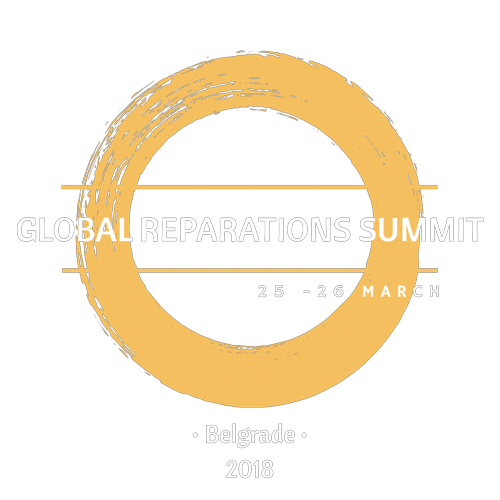
• Program •
25-26 MARCH • Belgrade • 2018
25ᵗʰ March
Registration
Opening Session
Budimir Ivanišević, Executive Director, Humanitarian Law Center
Overview of the Global Initiative for Justice, Truth and Reconciliation and Project Goals
Ereshnee Naidu-Silverman, International Coalition of Sites of Conscience
Reflections Panel: Stories of Survivors
Moderator: Ereshnee Naidu-Silverman, International Coalition of Sites of Conscience
Speakers: Dževad Koldžić and Victor Ochen
Coffee Break
Plenary Session I : Sources of Reparations
Engaging in a substantive discussion around the different sources of reparations through the lens of legitimacy and societal faith in reparations
mechanisms, identifying institutional strengths and shortcomings, and how to strengthen/bolster these processes in future.
This will include discussion around identifying institutional sources of reparations and how their intentions/goals/ purpose connect with reparations outcomes in reality, how this can impact the perception of legitimacy in institutions from the perspective of victims and the need for transparency to assist in legitimacy.
Moderator: Bridget Rutherford, Public International Law & Policy Group
Panelists:
- Bhavani Fornseka (Sri Lanka)
- Veronica Torras (Argentina)
- Abdoulaye Macalou (Mali)
Lunch Break
Plenary Session II : Prioritization through Victim Hierarchies
Victim hierarchies often challenge the application of the Right to a Remedy where not all forms of victimhood are treated as equal, these divisions are often perpetuated by both reparations mechanisms and by victims themselves.
Hierarchies and their impacts will be analysed through the scope of prioritization based on types of violations, paying particular attention to
victims of sexual violence, as well as economic considerations, ending with a discussion on effective ways to balance the inequalities.
Moderator: Annah Moyo, Centre for the Study of Violence and Reconciliation
Panelists:
- Igor Cvetkovski (IOM)
- Fatna EL Bouih (Morocco)
- John Caulker (Sierra Leone)
Coffee Break
Plenary Session III : Distribution of Reparations
A chain is only as strong as its weakest lin: for reparations, mechanisms are only as useful as their capacity to deliver.
This will include a discussion of sequencing issues, discussing different stages of reparations, and follow the questions of what reparations are offered,
when, by who and how, followed by a discussion of the idea of collective and individual reparations and development reparations.
Moderator: Jennifer Tsai, ABA Rule of Law Initiative
Panelists:
- Jairo Rivas (Peru)
- Ram Kumar Bhandari (Nepal)
- Aimee Ongeso (Kenya)
Welcome Dinner
26ᵗʰ March
Recap of Issues Raised on Day One via video link
Yasmin Sooka, Executive Director, Foundation for Human Rights, former South Africa and Sierra Leone Truth Commissioner and Chair of the UN
Commission on Human Rights in South Sudan
Presentation of the Report: Key Findings, Recommendations and Goals for the Day
Relja Radosavljevic and Isabelle Kavanagh, Humanitarian Law Center
Coffee Break
Working Group I: Updating the Basic Principles
Participants will further explore issues raised, thus far, in plenary
discussion, focusing on developing a small set of deliverables to
be reached by the close of this session.
Facilitators:
Bridget Rutherford, Public International Law & Policy Group
Relja Radosavljevic, Humanitarian Law Center
Languages: English, Spanish, BCS
Working Group II: Looking Ahead
Focusing on the needs of countries that are embarking on transitional justice processes or emerging from a transitional justice process, this session will provide participants with the opportunity to identify areas of the greatest concern to reparations, with reference to the specific needs and types of violations, and to discuss and propose creative solutions to remedy these issues going forward.
Countries: Sri Lanka, South Sudan, Iraq
Facilitators:
Kirsten Lavery, Public International Law & Policy Group
Ereshnee Naidu, International Coalition of Sites of Conscience
Languages: English, Arabic, French
Lunch Break
Working Group III: Recommendations for the State
How can the State meet its obligations:
- Transparency and accountability,
- Effective categorization of victims.
- Equal treatment of victims, and
- Discussing shortcomings and possible solutions.
Facilitators:
Fathi Zabaar, International Coalition of Sites of Conscience
Anna Moyo, Center for the Study of Violence and Reconciliation
Languages: English, Arabic, French
Working Group IV: Recommendations for CSOs
How can CSOs position themselves to:
- Advocate for improvements to the Right to a Remedy,
- Facilitate accountability and transparency of reparations mechanisms, and
- Support victims and states during the reparations process.
Facilitators:
Nomathamsanqa Masiko, Center for the Study of Violence and Reconciliation
Jennifer Tsai, ABA Rule of Law Initiative
Languages: English, Spanish, BCS
Coffee Break
Summary Session: Presentation of the results from the working groups
Volunteer participants will present the results from the working groups and invite participants to support the joint recommendations reached throughout
the day.
Speakers:
Isabelle Kavanagh and Relja Radosavljevic, Humanitarian Law Center, on behalf of the GIJTR
Humanitarian Law Center
Dečanska 12,
• 11000 Beograd • Srbija •
Phones:
+381-11-3349-600
+381-11-3349-766
+381-11-3349-856
Fax:
+381-11-3232-460
E-mail:
office@hlc-rdc.org

